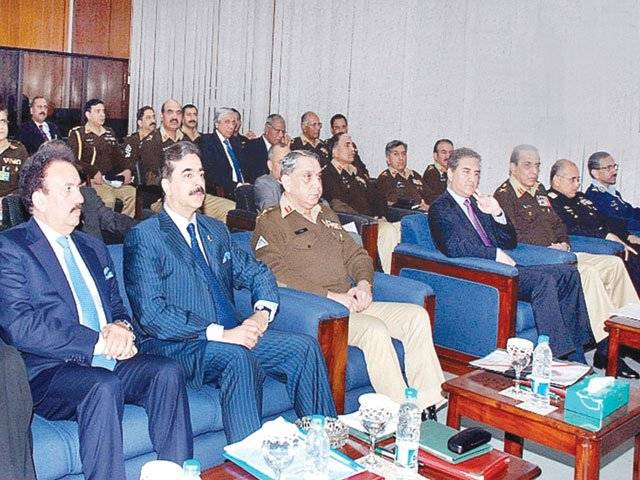Rawalpindi The National Command Authority met Wednesday with the Prime Minister in the Chair. This was the 16th NCA meeting, but the first meeting since the Prime Minister was made the Chairman by the President. A matter of great urgency was the formulation of a clear stance on the Fissile Material Cut Off Treaty (FMCT) presently being negotiated in the Conference on Disarmament in Geneva, as a number of misgivings had arisen over the last year on this issue. The fact that the NCA Press Release referred to a Fissile Material Treaty (FMT) rather than an FMCT showed that one point of consensus has been over the need to have present stockpiles reduced before a cut off date is accepted for future stockpiles. The NCA also reiterated that Pakistans position in the CD will be determined by national security interests as well as objectives of strategic stability in South Asia. Behind this diplomatic language it would appear that Pakistan has decided to maintain its national position on the FMT focusing first on reduction of existing fissile material stockpiles and also on its demand for an international verification regime - because without these there can be no stability in the long run in South Asia. The NCA emphasized that discriminatory measures perpetuate regional instability and detract from the objectives of nuclear disarmament and non-proliferation and are, therefore, unacceptable to Pakistan. As such Pakistan, as decided by the NCA, will not support any policy or measure that is prejudicial to its legitimate national security interests. The NCA also reiterated Pakistans position in the nuclear field, that it expects to be treated as an equal partner in efforts for nuclear disarmament and nuclear nonproliferation. It demanded that nondiscriminatory policies need to evolve and the reality of Pakistans nuclear weapon status needs to be accepted in order to move ahead towards global nonproliferation targets. In South Asia, the NCA declared that unless the existing asymmetries and outstanding disputes are not resolved, nuclear nonproliferation and disarmament cannot move forward as they are linked to the regions security dynamics. While expressing satisfaction over the safety and security of Pakistans nuclear assets and the credibility of its strategic deterrence, the NCA highlighted the Indian efforts to destabilise the region by amassing offensive weapon systems, missile defence and aggressive military doctrines, especially those relating to efforts to rationalize war fighting in a nuclear environment. The NCA also for the first time spoke about the negative fallout on the nonproliferation regime of India-specific exemptions made by the Nuclear Suppliers Group which had allowed India to reach fuel supply agreements with several countries. This would add to its fissile stockpiles and up the nuclear ante in the region since Pakistan could not remain oblivious to these developments. A welcome development was the NCAs clear statement that while Pakistan will continue to act responsibly and acid a nuclear arms race in the region, it will not compromise on its security interests and the criticality of sustaining a credible deterrence. Finally, the meeting reviewed plans for civil nuclear power generation under IAEA safeguards as part of the national energy security strategy to ensure sustained economic growth. Because Pakistan already has advanced nuclear fuel cycle capability it can participate in the provision of nuclear fuel supply cycle services under the IAEA - which has already floated the idea of a Nuclear Fuel Bank under IAEA control to further a non-discriminatory nuclear fuel supply assurance mechanism.
Friday, April 19, 2024
India's offensive doctrines threaten strategic stability

Pak economy improving, funds will be provided on request: IMF
9:57 PM | April 19, 2024
Minister advocates for IT growth with public-private collaboration
9:57 PM | April 19, 2024
Judges' letter: IHC seeks suggestions from all judges
9:55 PM | April 19, 2024
Formula 1 returns to China for Round 5
9:05 PM | April 19, 2024
Germany head coach Julian Nagelsmann extends contract till 2026 World Cup
9:00 PM | April 19, 2024
A Tense Neighbourhood
April 19, 2024
Dubai Underwater
April 19, 2024
X Debate Continues
April 19, 2024
Hepatitis Challenge
April 18, 2024
IMF Predictions
April 18, 2024
Kite tragedy
April 19, 2024
Discipline dilemma
April 19, 2024
Urgent plea
April 19, 2024
Justice denied
April 18, 2024
AI dilemmas unveiled
April 18, 2024
ePaper - Nawaiwaqt
Advertisement
Nawaiwaqt Group | Copyright © 2024





